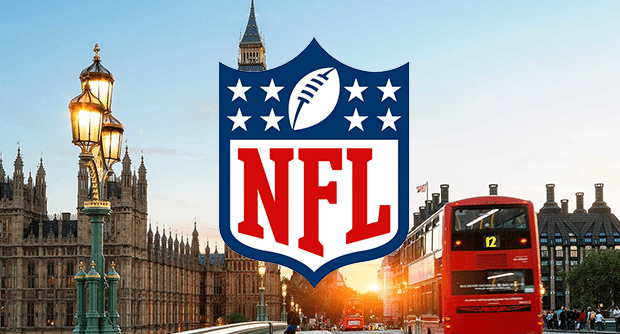What impact is the NFL having in the UK?

On September 24th 2017, 84,582 English fans packed Wembley Stadium in London to watch the Jaguars beat the Ravens 44-7. A week later, another 84,000-strong audience saw the Saints beat the Dolphins 20-0, and two subsequent matches drew more than 74,000 people to Twickenham Stadium, London.
The success of the NFL International Series, which began in 2007, has revealed an appetite for American football in the UK, and in London in particular. The crowd for the inaugural match of the Series – the first regular season NFL game to be played outside the US – was over 80,000, and with coverage of the matches available on free-to-air television, the games have attracted a growing audience, with 23 million people in the UK watching the games in 2017.
However, the UK’s links with this most American of sports go back further than you might think. The first organized game took place in 1910 between sailors from the USS Vermont and the USS Idaho, and there were several matches between 1941 and 1945 when thousands of US service personnel were based in the UK.
In 1982, Channel 4 began to show weekly NFL highlights, which caught on with the UK public, culminating in an audience of over 4 million for the 1986 Super Bowl. The growing interest in the sport in the UK led to the first UK league, with London Ravens beating the Northwich Spartans 48-0 in the first match between UK teams. By 1986, there were 102 teams in the UK, and in 1991, the new London Monarchs won the inaugural World Bowl.
The London Monarchs were the UK entrant in the fledgling World League, an attempt by the NFL to spread interest in the sport across the globe. The Monarchs were initially a huge success. Playing their home games at Wembley Stadium, they attracted an average crowd size of 40,483. However, this London-based flowering of the sport proved to be a false dawn. Interest in the Monarchs among the London audience, perhaps affected by the growth in popularity of the English soccer Premier League, began to dwindle.
By 1995, the Monarchs had moved to White Hart Lane, home of Tottenham Hotspur, where the average attendance fell to 16,343. In 1998, they rebranded themselves as the England Monarchs, playing their home games at a variety of stadiums around the UK, but this proved a failure. Away from the sport’s heartland in London, interest was minimal and the Monarchs attracted crowds of less than 6,000. That year, the Monarchs were disbanded, followed by the closure of the only other UK franchise, the Scottish Claymores, in 2004.
However, while this high-profile failure suggested that UK audiences were losing interest in the sport, the massive popularity of the International Series has shown otherwise. The first 40,000 tickets to the historic Dolphins versus Giants game in 2007 sold out within 90 minutes, and all but one of the games in the last ten years have been sellouts.
This success has led to talk of a new London team within four years. The UK capital has a lot to offer an NFL franchise. An international metropolis, it has a wide potential fan base and television market and a number of stadiums that could host a team.
The experience of the Monarchs suggests that the NFL may opt to transfer one of its 32 franchises to the UK, rather than set up a new team, and the Jacksonville Jaguars would be the most likely candidate. Shahid Khan, the owner of the Jaguars, also owns soccer club Fulham, based in West London, and the Jaguars have already become known as the unofficial NFL team of the UK, having done a deal to play a game in London every year until 2020.
Later this year, the Jaguars – who came within four points of reaching the Super Bowl – will be taking on the reigning champions, the Philadelphia Eagles, at Wembley, and this clash between London’s unofficial team and the NFL’s best is sure to attract huge interest and not just among sports fans. Betting on NFL games is increasingly popular in the UK, both pre-match and in-play, and this game is likely to catch the imagination of the betting public.
Though the experience of the Monarchs serves as a warning to those who might overestimate support for the game among London fans, the future of the sport in the UK appears good. According to Sport England, more than 40,000 people in the UK aged 14 or over play American football, and the Jaguars have launched a scholarship programme called Gridiron Grant, offering a university scholarship to students who graduate from the Jaguars’ own program or who are involved in American football in their local community.
Initiatives like this one and the continuing success of the International Series point to a bright future for the sport in London, and it is surely only a matter of time before American football fans in the UK capital get to cheer on an NFL team of their own.